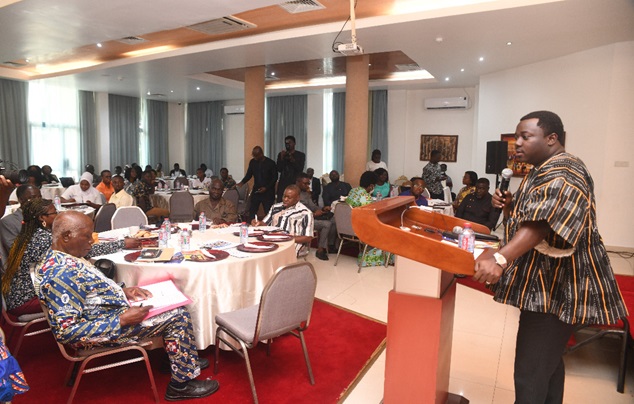John Ntim Fordjour, Deputy Minister of Education, addressing participants
DICKENS THUNDE, National Director, World Vision Ghana, has called on authorities in the country’s education sector, to consider teaching children in their mother language first to enable them better grasp what they are taught instead of using colonial languages.
Mr. Thunder, who made the appeal at the commemoration of this year’s International Literacy Day at the Best Western Premier Hotel in Accra recently, said “It is a harsh reality that the colonial languages have taken a very high-status position in Africa such that in many countries in Africa, education is delivered in a language, children do not understand. From the first day in school, the children are exposed to the new language and their mother tongue is not used in school. The reality is that, the children do not understand the teacher until several years into their education. Consequently, most children in Africa find themselves having to try to learn through a language they do not understand. Many of them fail and drop out before they learn any content.”
The National Director said the reading skills acquired in children’s mother language help them learn a second language faster hence the introduction of the Unlock Literacy (UL), an evidence-based literacy approach to improve children’s core reading skills. The model subscribes to the early-exit bilingual literacy approach which posits that, children learn to read fast and better, when they start learning to read in their Mother Language.
“According to the World Bank, the reading numbers in Sub-Saharan Africa and in Ghana, portends a hazy future for Africa’s development agenda,” he further posited.
Francis Asumadu, Director, Complementary Education Agency, in an address, said growing through public school system is considered challenging for most children in Ghana for many decades.
According to him, children from disadvantaged backgrounds, most of whom are found in public schools, tend to have learning deficits arising out of issues such as late enrolment and poor preparation at the early childhood level.
He added “A child who enters grade one at age 8 or 9 has already missed years through which the brain should be calibrating and repositioning for learning. This child would have to struggle through school to catch up with the system. Most of these children are not able to meet the demands of drawing from missed years of learning and new information. Added to this ill prepared learner is the seeming absence of a motivated teacher.”
Prof. Ladé Wosornu, a retired doctor and author, who chaired the occasion, themed ‘Transforming Literacy Learning Spaces’ said the lack of information and illiteracy create a forced dependence on others, which can lead to economic instability, poor quality of health, vulnerability to deception, exploitation, and abuse as well as lack of self-worth and even loss of cultural identity.
“I will like to ask how is Ghana treating the language issue in education? Is the new standard based curriculum delivering literacy service to early grade learners using the mother language?”
A baseline survey conducted by World Vision in Ghana in 2013, indicated that only 3% of children in grade 2 in our programme districts can read with comprehension (World Vision Ghana Baseline Report, 2013).
BY Ebenezer Amponsah

